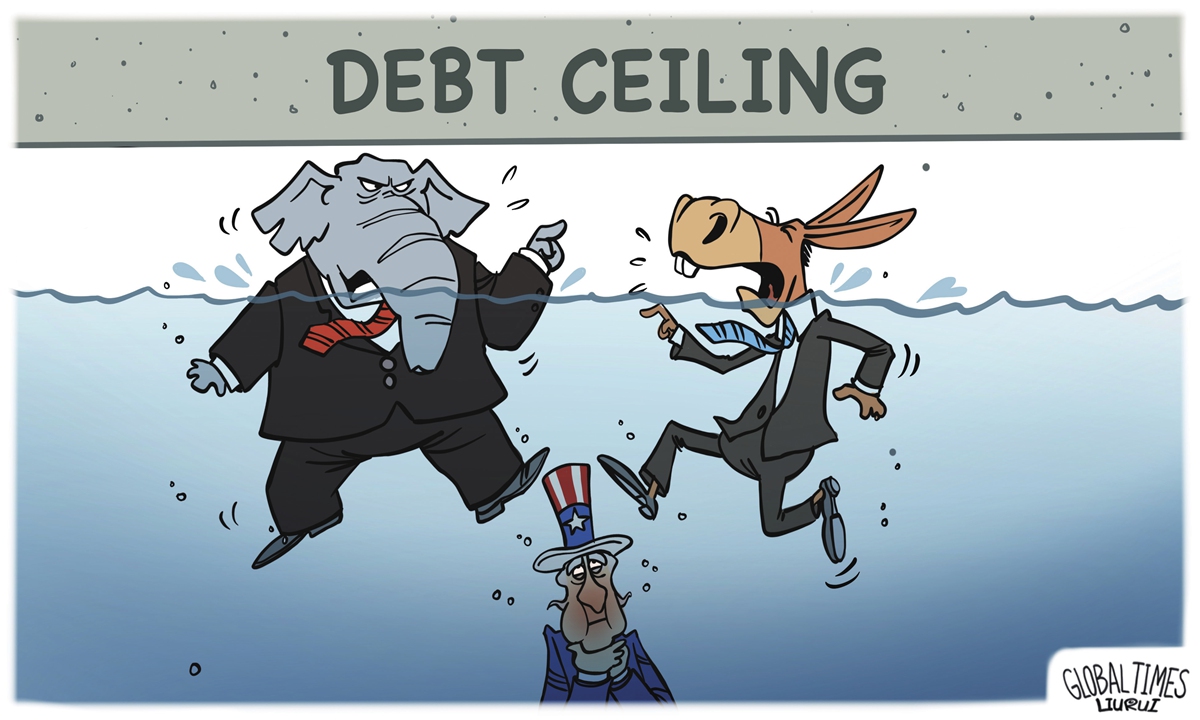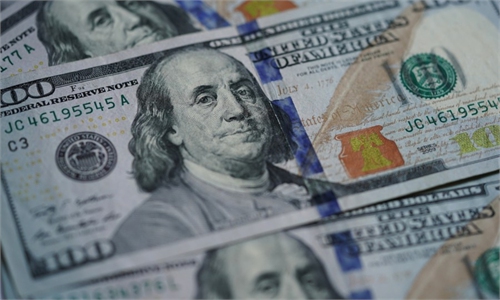US brinksmanship over debt ceiling sparks global concerns
Move could accelerate de-dollarization, boost yuan internationalization

Debt ceiling Illustration: Liu Rui/Global Times
After US President Joe Biden and congressional leaders failed to make any breakthrough on the issue of raising the US government's debt ceiling during a closely watched meeting on Tuesday, concerns are growing over what has been described as "catastrophic" impact on both the US and global economies if the US defaults on its obligations.
If the debt ceiling is not raised, the US government could fail to pay its bills starting as early as June 1, and defaults on US debt could lead to a recession in the US and severe consequences for the global economy, US officials and analysts warned. While US officials often reach a deal at the last minute, brinksmanship over the issue could still send jitters through global financial markets, analysts noted.
For China, while downward pressure remains on economic growth as some recent indicators have showed, the pace of recovery remains solid and the Chinese economy will be resilient enough to cope with any potential uncertainty, analysts said, with some arguing that the US' brinksmanship could accelerate de-dollarization and help boost the yuan's internationalization.
Default risks
Biden met with congressional leaders, including Kevin McCarthy, a Republican lawmaker and speaker of the US House of Representatives, to discuss the debt ceiling issue, but the two sides apparently remain at loggerheads. Following the meeting, Biden said that the "politics, posturing and gamesmanship" will continue in the coming weeks, although he described the meeting as "productive," adding that defaultis "not an option." Meanwhile, McCarthy said, "I didn't see any new movement," as AP News reported.
US Treasury Secretary Janet Yellen warned that the US government could run short of cash by June 1. As that deadline is rapidly approaching, concerns are growing that US leaders will not be able to reach a deal on the debt ceiling soon enough to avoid potential damages. The White House has warned that a US default could lead to an economic recession. Yellen has also been reaching out to US business leaders to "explain the 'catastrophic' impact a US default on its debt would have on the US and global economies," Reuters reported on Monday. Highlighting the seriousness of the issue, Biden said on Tuesday that it was possible he could postpone a trip to Japan and Australia to stay in Washington for the negotiations.
The debt ceiling issue has become a tool for partisan fights between the two main political parties of the US, and repeated fights over the issue have brought great uncertainty to markets, said Gao Lingyun, an expert at the Chinese Academy of Social Sciences in Beijing.
Though US leaders will likely reach a deal in the end, "the result will come at the cost of US citizens and those of other countries," Gao told the Global Times on Wednesday, noting that raising the debt ceiling will mean "diluted" holdings by US and global holders as well as increased debt for the US government. "This US practice is unsustainable."
The US has changed its debt ceiling more than 100 times since World War II, and while the two US political parties often fight over the debt ceiling, they often reach a deal to avert a US default. However, even if a US default is averted, merely getting close to the deadline often causes serious financial repercussions. In 2011, a protracted fight over the issue prompted US ratings agency Standard & Poor's to downgrade the US' credit rating for the first time, sending global financial markets down significantly.
Currently, while many anticipate a deal on the debt ceiling before the deadline, the US economy is already facing great uncertainty, including a crisis in its regional banks, analysts noted.
"Changes in the aftermath of the banking crisis remain uncertain, which is an unstable factor for the recovery of the global economy, and the market cannot read the direction of the US dollar," Hu Qimu, deputy secretary general of the digital real economies integration Forum 50, told the Global Times on Wednesday.
De-dollarization
Hu said that given such uncertainty, many economies around the world need to find safe havens to reduce reliance on the US dollar and the disruptions caused by risks in the US. The partisan fight over the debt ceiling issue "could bring some opportunities for the yuan's internationalization and de-dollarization," he said.
As the US government continues to weaponize its dollar hegemony to sanction other countries and the US economy faces growing risks, many economies have moved to reduce reliance on the US dollar and some have switched to the Chinese yuan or other currencies for settlement.
"After experiencing the crisis in 2008 and the impact of various malign US actions on countries in recent years, this time is an opportunity for countries to push for de-dollarization," Hu said.
While China's economy also faces growing downward pressure due to shrinking external demand, the country's economic recovery this year is still widely expected to be a bright spot in the otherwise grim global economic outlook.
Official data showed on Wednesday that China's imports fell 7.9 percent in April, while exports grew 8.5 percent, slower than the 14.8 percent growth in March. The data prompted some foreign pundits to hype concerns over China's economic outlook.
However, Chinese analysts noted that weakening external demand is the reason and other growth drivers such as consumption and investment will likely help the world's second-largest economy to rebound steadily.
"Using the monthly trade data to badmouth China's economy is unconvincing. Among the three main growth drivers of the Chinese economy, foreign trade only accounts for about 20 percent," Hu said.
Meanwhile, Chinese officials are moving swiftly to take measures to stabilize growth, including support measures for the trade sector and consumption. A meeting of the Political Bureau of the Communist Party of China Central Committee on April 28 noted that work should be coordinated to ensure sustained economic growth, boost the dynamism of the economy, improve social expectations, and prevent and defuse risks and hidden dangers, according to Xinhua.

